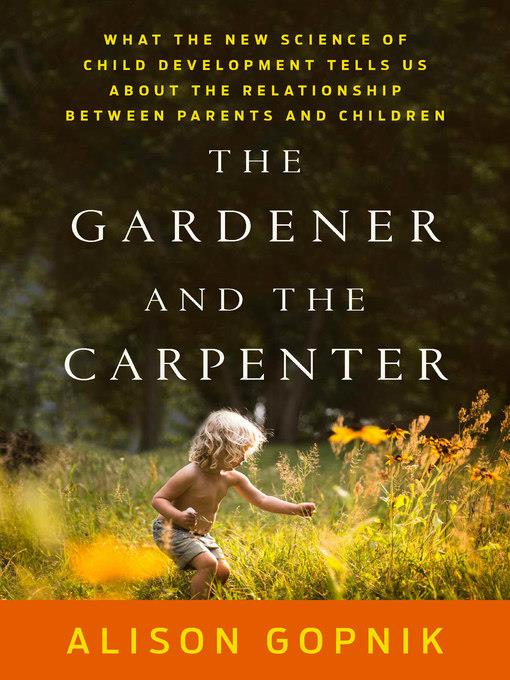
The Gardener and the Carpenter
What the New Science of Child Development Tells Us About the Relationship Between Parents and Children
کتاب های مرتبط
- اطلاعات
- نقد و بررسی
- دیدگاه کاربران
نقد و بررسی

Starred review from April 18, 2016
What a relief to find a book that takes a stand against the practice of “helicopter parenting” so prevalent today. Developmental psychologist Gopnik (The Philosophical Baby) provides comfort for parents who want their children to experience a free-form childhood where they can spread their wings and grow up into well-rounded, responsible adults. Her book not only dispels the myth of a single best model for good parenting but also backs up its proposals with real-life examples and research studies. Gopnik argues that the modern notion of parenting as a kind of avocation or career is “fundamentally misguided, from a scientific, philosophical, and political point of view, as well as a personal one.” Employing the two titular professions as metaphors for opposing approaches to parenting, she maintains that parents should not try to shape their children like a carpenter, but rather provide them with room to grow, like a gardener, into creative thinkers and problem solvers. “Being a parent is simply about loving children,” Gopnik states, except that “love is never simple.” This book will provide helpful inspiration for parents and may prompt some to rethink their strategies. An extensive bibliography of further recommended reading is included. Agent: Katinka Matson, Brockman Inc.

May 15, 2016
An internationally recognized leader in the field of childhood learning debunks the concept of "good parenting."Gopnik (Psychology and Philosophy/Univ. of California; The Philosophical Baby: What Children's Minds Tell Us about Truth, Love, and the Meaning of Life, 2009, etc.) is a grandmother and the director of a cognitive science laboratory. Her firsthand experience of the complexities of being a parent in today's society has led her to challenge the accepted view of "parenting." It is "not actually a verb," she writes, "not a form of work, and isn't and shouldn't be directed to the goal of sculpting a child into a particular kind of adult." Rather, parents should simply provide children with a loving, nurturing environment in which they can learn and thrive. The insatiability of children's curiosity is legendary. As Gopnik notes, research has shown that "pre-schoolers average nearly seventy-five questions per hour." Contrary to the traditional parenting model, which sets specific educational goals for children, parents can play a crucial role simply by responding to a child's questions. "Parents don't have to consciously manipulate what they say to give children the information they need," writes the author. They learn through rough-and-tumble play, careful observation of their environment, direct interaction, and the let's-pretend games they invent for themselves. "Pretending is closely related to another distinctly human ability," writes Gopnik, "hypothetical or counterfactual thinking--that is the ability to consider alternative ways that the world might be." In the author's view, it is imperative for caretakers and educators to nurture young children's curiosity, and they should also allow adolescents to experiment and learn by apprenticeship. Gopnik concludes that recognizing the dichotomy between the goal-oriented carpenter and the nurturing gardener is an appropriate metaphor for our broader cultural values. "Just as we should give children the resources and space to play, and do so without insisting that play will have immediate payoffs," she writes, "we should do the same for scientists and artists." A highly thoughtful and entertaining treatment of a subject that merits serious consideration.
COPYRIGHT(2016) Kirkus Reviews, ALL RIGHTS RESERVED.

























دیدگاه کاربران